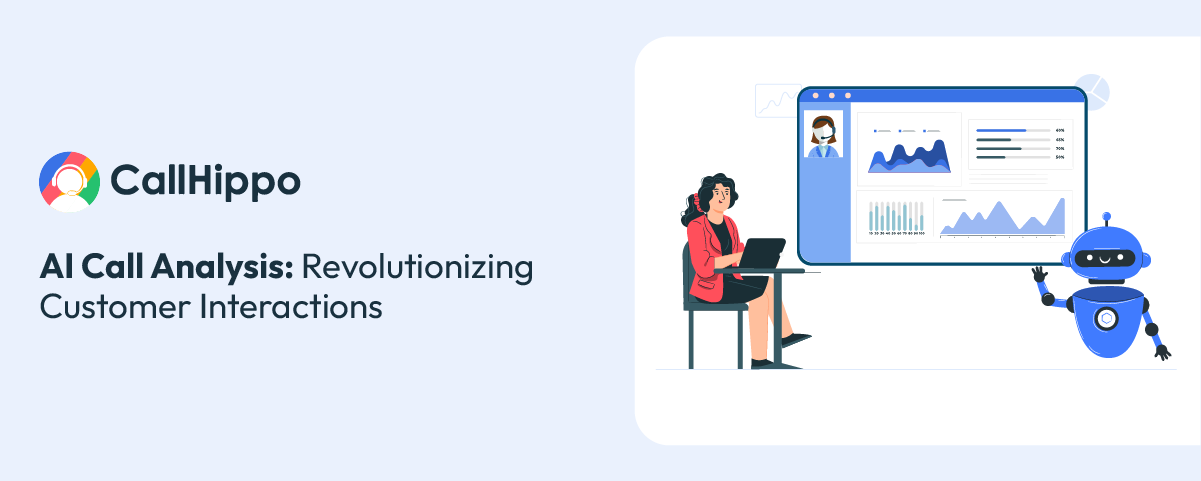Here’s an Overview of the Top AI Call Analysis Tools:
AI call analysis uses artificial intelligence, including speech recognition and natural language processing, to automatically process and evaluate phone conversations. It converts spoken words into valuable data, enabling businesses to understand customer meaning, intent, and emotions.
- CallHippo AI Copilot: Simplifies call monitoring with real-time transcription and sentiment analysis. Pricing starts around $18/user/month for base plans, plus a $10/user/month AI add-on.
- Salesify: Optimizes sales calls with AI-powered scoring and sentiment detection through intuitive dashboards. A free plan is available, with paid plans starting at $39/user/month.
- Gong: A leading conversation intelligence platform for deep business insights and AI-driven coaching. Pricing isn't public, but it involves platform fees and significant per-user costs.
- Salesloft: Combines AI call analysis with sales engagement automation for improved outreach and efficiency. Pricing details are not publicly available.
- CallRail: Specializes in AI-enhanced call tracking and marketing attribution for inbound calls. "Call Tracking + AI" plans begin at $50/month, plus usage fees.
- JustCall: A cloud-based call center solution with AI features, enhancing engagement via voice, SMS, and CRM integrations. Their AI Suite's "Team+" plan costs $49/user/month (billed annually).
- Observe.AI: Focuses on AI-powered quality assurance and real-time coaching for call centers. Pricing is custom and primarily targets large enterprises, with no public rates.
- Enhanced Accuracy in Transcription
- Time-Saving Automation
- In-Depth Insights into Customer Behavior
- Improved Customer Experience
- Scalability of Call Monitoring
Benefits of AI Call Analysis:
Many businesses lose up to 40% of valuable customer insights due to inconsistent call quality and manual reviews. AI call analysis solves this by automatically transcribing and analyzing calls with high accuracy, delivering real-time feedback to improve issue resolution and customer experience. Using AI to analyze phone calls enhances agent performance and uncovers deep customer sentiment, reducing team workload and boosting support and sales results.
Explore how adopting AI call analysis can unlock actionable insights and drive measurable improvements in your customer interactions.
What is AI Call Analysis?
AI call analysis automatically refers to the use of artificial intelligence technologies to process and evaluate phone conversations. It combines to convert tools such as speech recognition, natural language processing (NLP), and machine learning into valuable data. This enables businesses to analyze conversations and customer call interactions better without manual effort.
At its core, AI turns the words spoken into text using Automatic Speech Recognition (ASR). Then, the natural language processing system helps to understand the meaning, intentions, and emotions behind the conversation. By analyzing tone, keywords, and speech patterns, AI gains valuable insights from calls.
Using AI to analyze phone calls allows companies to detect customer emotions, identify common issues, and evaluate agents’ performance. This data can be used to improve customer experience, address customer pain points, identify trends, optimize sales call techniques, and increase support quality. AI call analysis transforms raw conversations into valuable business intelligence quickly and accurately.
- 80% of companies using AI-powered call analysis report a significant improvement in agent performance and customer satisfaction. This shows AI's direct impact on enhancing communication quality.
Top AI Call Analysis Tools
Choosing the right AI call monitoring tool is essential to unlock the full potential of your customer interactions. These tools use AI to analyze calls, provide real-time insights, and improve agent performance. Below are some of the top AI call analysis platforms, their key features, pros, cons, and pricing details to help you decide.
| Platform | Pricing | Best For |
|---|---|---|
| CallHippo AI Copilot | $10 Per User/Month | Sales and customer support teams |
| Salesify | Starts at $35 per user per month | Every day, automation across teams |
| Gong | Custom pricing available on request | Omnichannel communication support |
| Salesloft | Starts at $75 per user per month | Expressive AI voices for media & support |
| CallRail | Plans start at $45 per month | High-accuracy speech recognition |
| JustCall | Starting at $30 per user per month | Open-source speech recognition |
| Observe.AI | Custom pricing based on company size and needs | Creating branded custom AI voices |
After extensive research and analysis, we have curated a list of the top call analysis tools. The services were evaluated based on factors such as pricing flexibility, feature comprehensiveness, ease of use, customer support quality, and overall value for businesses of different sizes, from Capterra, G2, and GetApp. We aim to assist businesses in identifying the most suitable tool to simplify their operations.
1. CallHippo AI Copilot
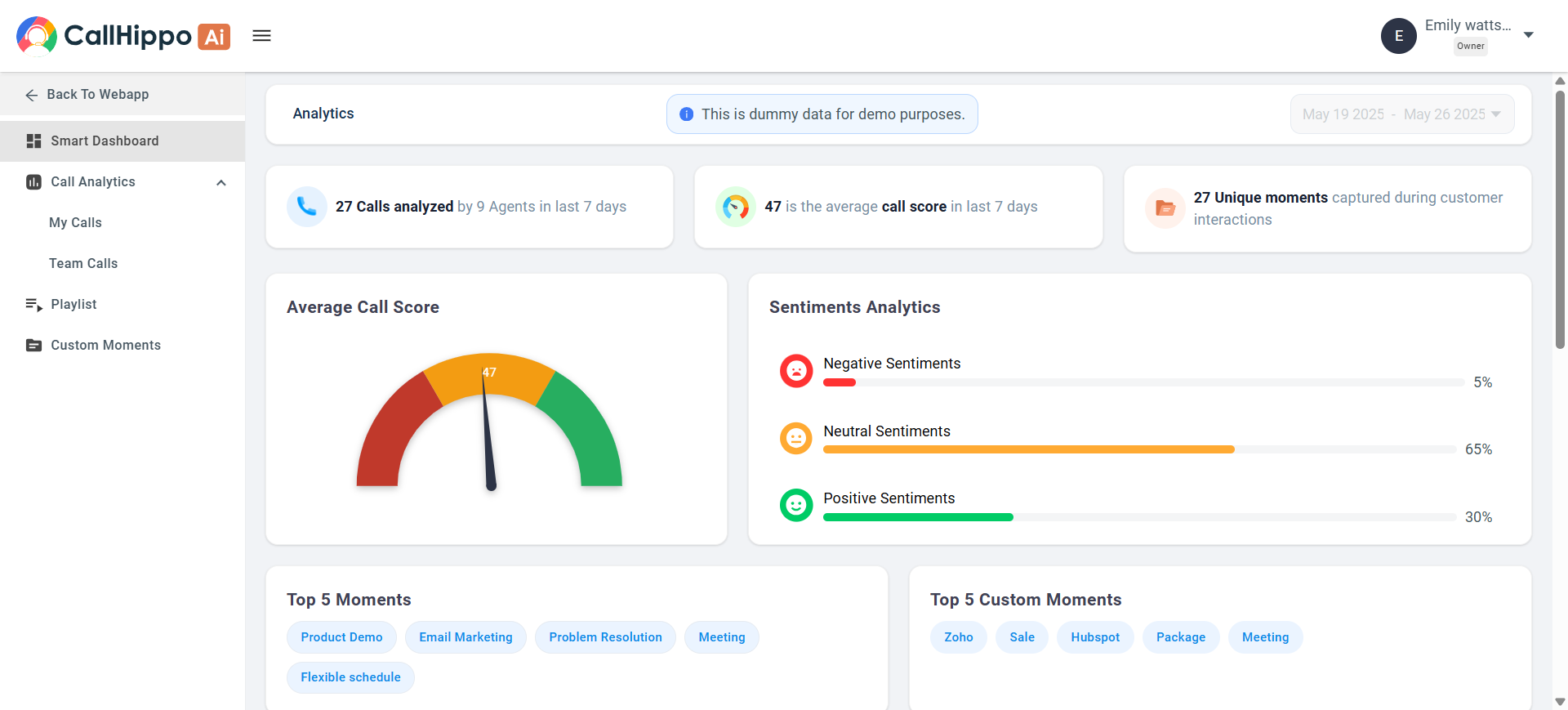
CallHippo AI Copilot is designed to simplify call monitoring using advanced AI. It provides real-time call transcription and sentiment analysis to improve agent performance. The platform integrates seamlessly with popular CRMs for smoother workflows. It helps businesses gain actionable insights quickly and efficiently.
Key Features
- Real-Time Call Transcription
- Sentiment Analysis
- Call Scoring
- CRM Integration
- Conversation Insights
- A user-friendly interface enables quick adoption across different team sizes.
- Customizable analytics provide insights tailored to unique business requirements.
- Fast and accurate transcription supports multiple languages for global teams.
- Requires a stable internet connection for optimal real-time call analysis.
- Pricing details are not clearly segmented for smaller businesses.
Pricing
- Contact sales for customized plans based on usage.
CallHippo AI Copilot
- Sentiment Analysis
- Key Topic Extraction
- Seamless CRM Integration

2. Salesify
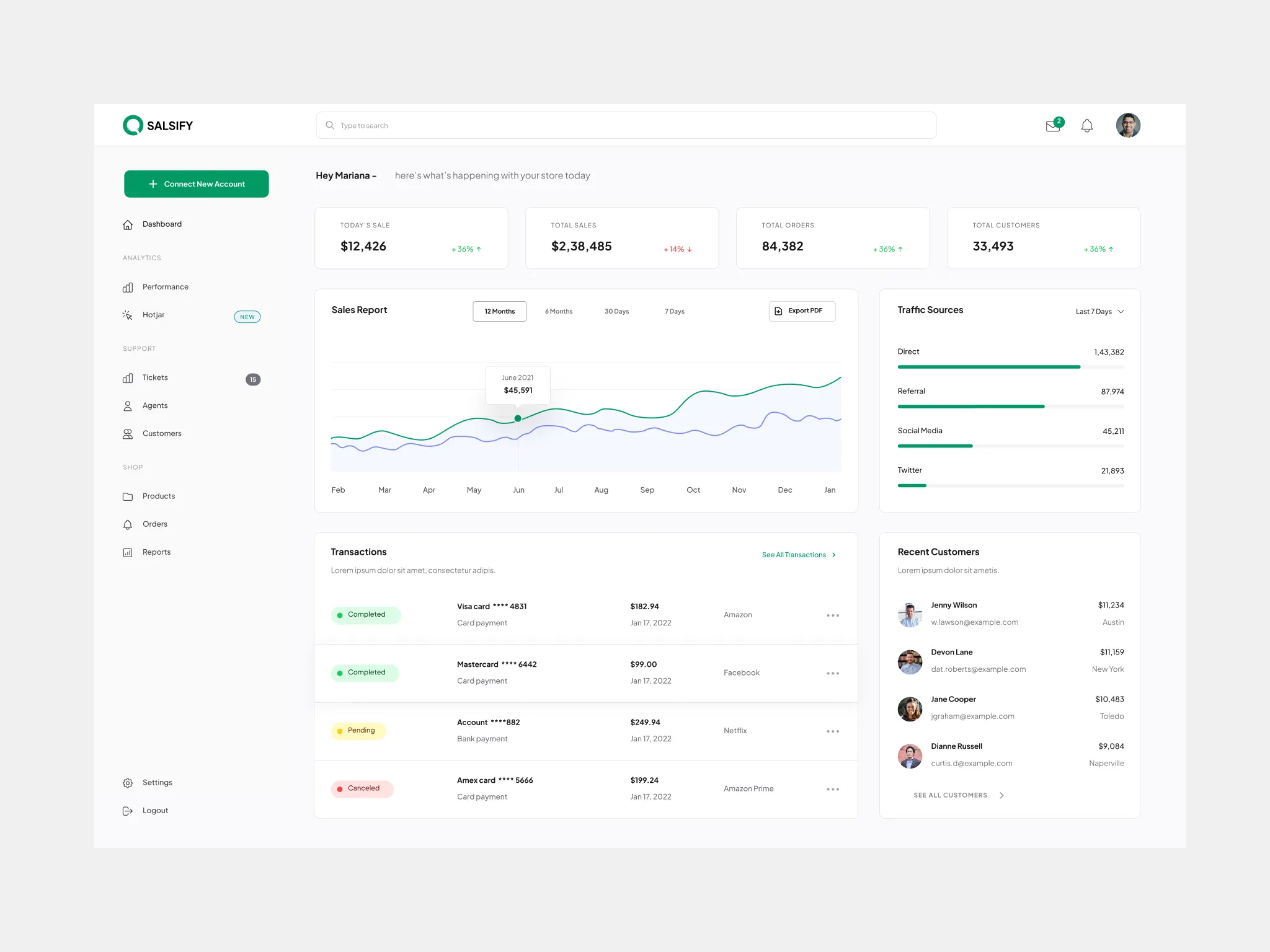
Salesify focuses on helping sales teams optimize their calls with AI-powered monitoring. It offers detailed call scoring and sentiment detection to enhance performance. The platform provides easy-to-understand dashboards for quick analysis. Salesify is built to scale with growing sales organizations.
Key Features
- AI-Powered Call Scoring
- Sentiment Detection
- Performance Dashboards
- Call Recording
- Automated Feedback
- Intuitive dashboard simplifies call insights for sales and management teams.
- Helps sales teams improve pitch quality through detailed call feedback.
- Scalable platform accommodates growing teams with evolving business needs.
- Limited customization in reporting may not fit all use cases.
- Real-time updates can sometimes experience minor delays or lags.
Pricing
- Starts at $35 per user per month.
3. Gong
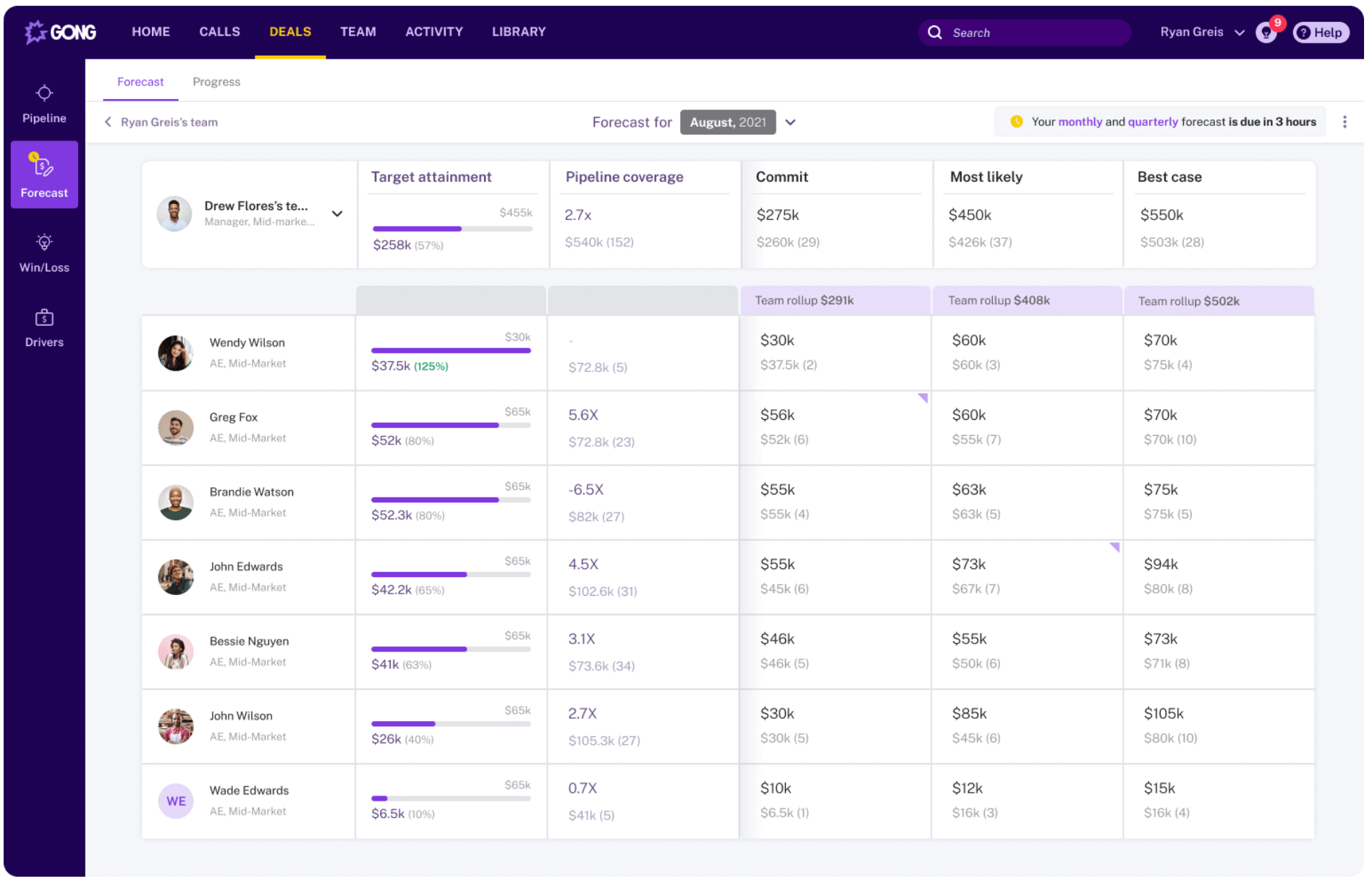
Gong is a leading AI conversation analytics platform trusted by many sales teams. It captures calls, emails, and meetings to extract critical business insights. The tool offers advanced coaching recommendations based on deep analysis. Gong’s integrations make it easy to sync with existing CRM systems.
Key Features
- Conversation Intelligence
- Deal Tracking
- AI-Driven Coaching
- CRM Integration
- Advanced Analytics
- Industry-leading AI delivers deep analysis of customer conversations.
- Integrates seamlessly with most major CRM systems and tools.
- Provides actionable coaching insights to improve sales team performance.
- Higher pricing may be prohibitive for smaller sales teams.
- Complex onboarding requires significant time and dedicated resources.
Pricing
- Custom pricing available on request.
4. Salesloft
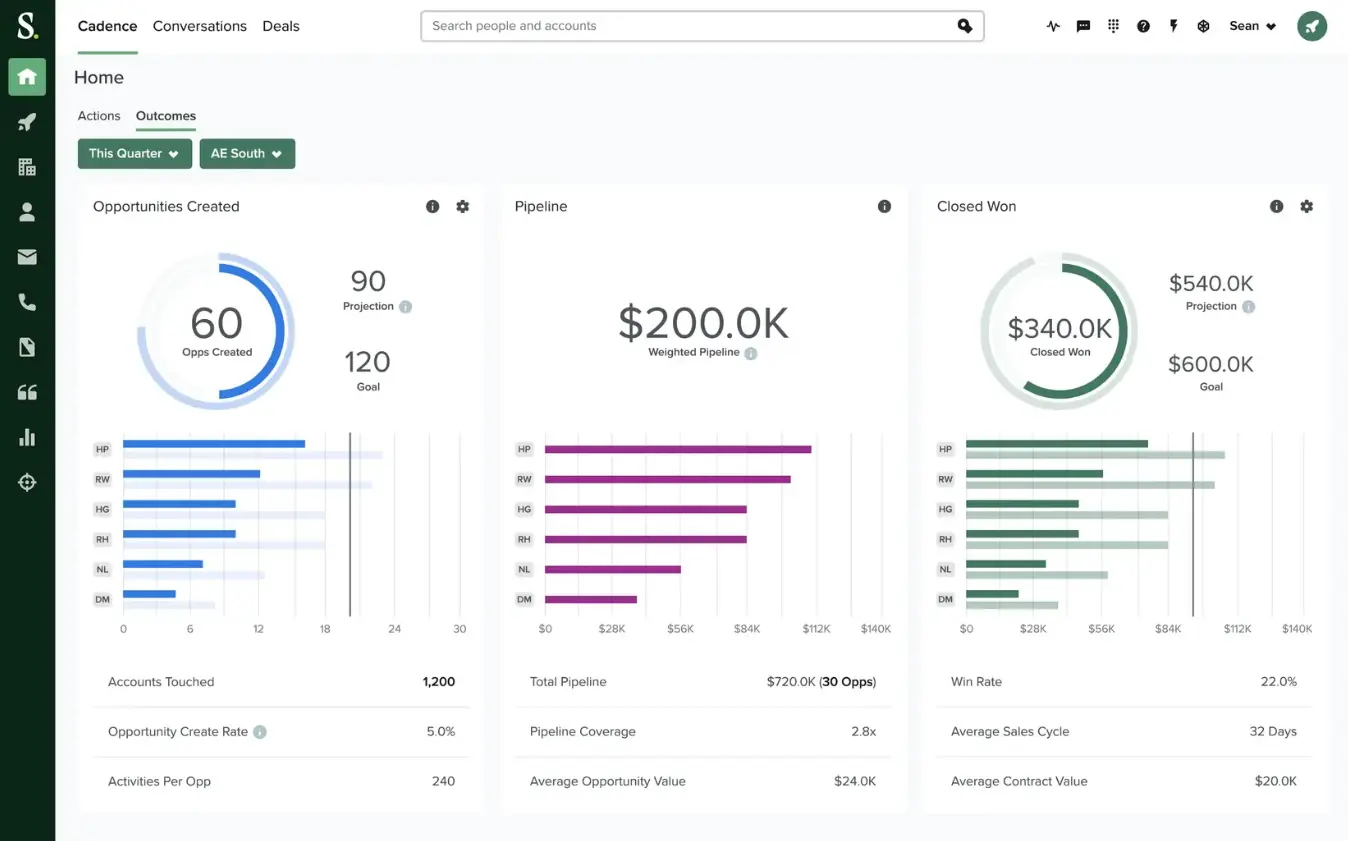
Salesloft combines AI call analysis with sales engagement automation. It supports real-time analytics and multichannel communications to improve outreach. The platform provides performance tracking and detailed reporting for sales teams. Salesloft helps automate repetitive tasks to increase efficiency.
Key Features
- Real-Time Call Analytics
- Dialer and Messaging
- Performance Tracking
- Sales Cadence Automation
- CRM Sync
- Supports multi-channel communication beyond phone calls for sales outreach.
- Offers detailed analytics to enhance overall sales team productivity.
- Automates repetitive tasks, saving time for strategic sales activities.
- Setup and onboarding can be complicated for new users.
- Pricing is higher compared to similar call analytics platforms.
Pricing
- Starts at $75 per user per month.
5. CallRail
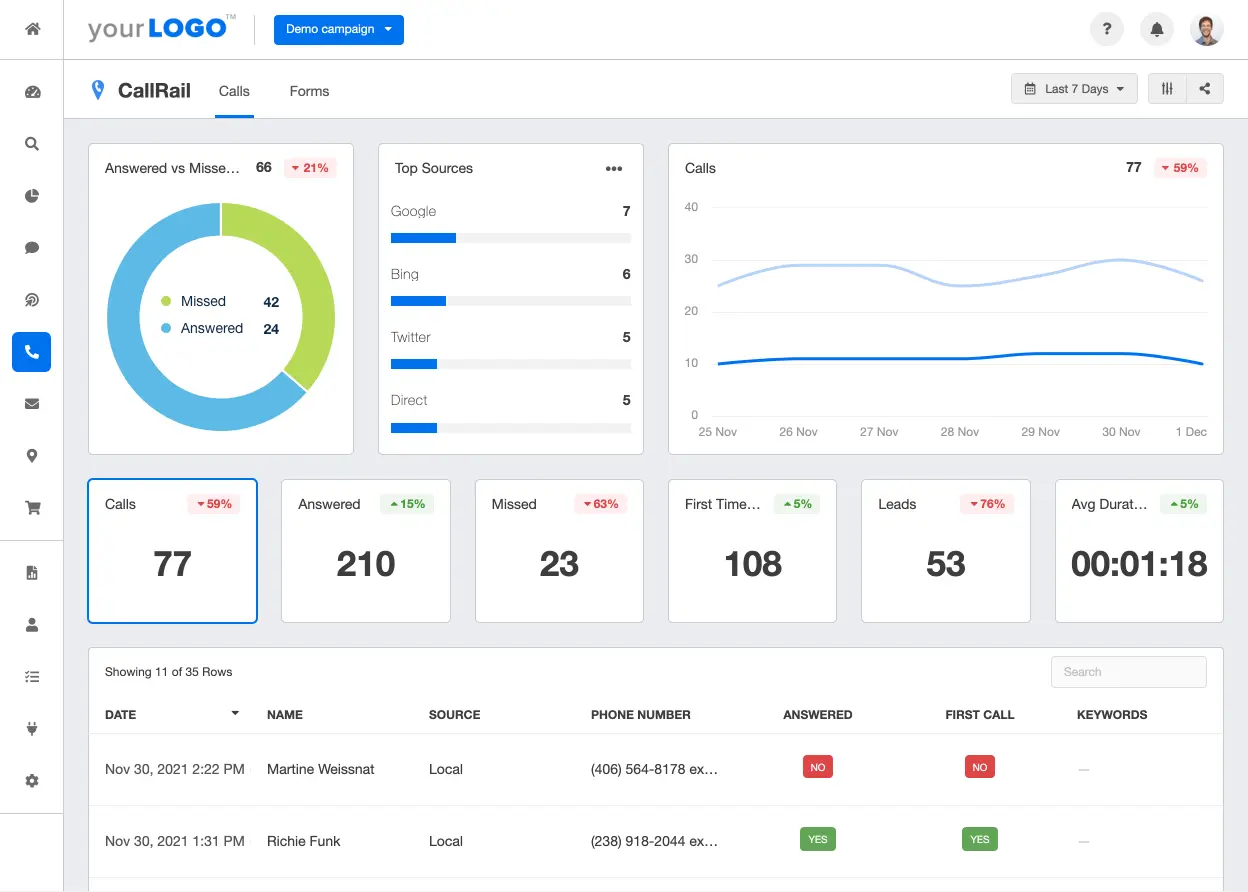
CallRail specializes in AI-enhanced call tracking and marketing attribution. It provides detailed keyword analytics and conversion tracking for inbound calls. The platform is ideal for businesses focused on measuring marketing campaign success. CallRail integrates well with advertising and analytics platforms.
Key Features
- Call Tracking
- Dynamic Number Insertion
- Call Recording
- Keyword Analytics
- Conversion Reporting
- Simple interface offers comprehensive call tracking and marketing attribution.
- Ideal for marketers needing precise inbound call performance data.
- Integrates smoothly with leading advertising and analytics platforms.
- Limited features for international call tracking and analysis.
- Advanced features are only available in higher-priced plans.
Pricing
- Plans start at $45 per month.
6. JustCall
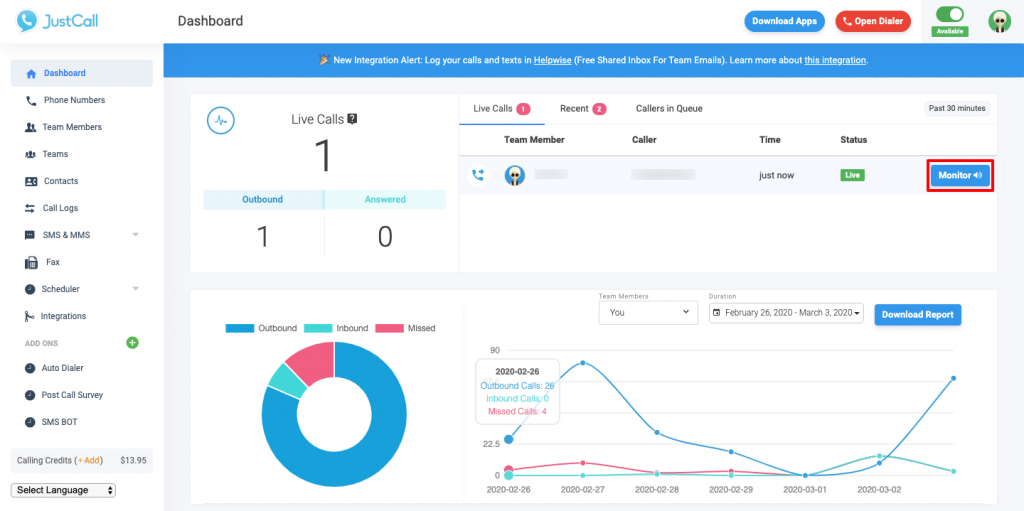
JustCall is a cloud-based call center solution with AI features for call monitoring. It supports voice, SMS, and CRM integrations to enhance customer engagement. The platform offers automation tools like IVR and call routing for efficiency. JustCall aims to boost agent productivity with an easy setup.
Key Features
- Call Transcription
- SMS Automation
- Call Recording
- CRM Integration
- IVR and Call Routing
- Easy to set up and user-friendly for teams of all sizes.
- Supports voice calls and SMS, enhancing multi-channel customer engagement.
- Responsive customer support resolves issues quickly and efficiently.
- AI call analysis features are less advanced than competitors’ offerings.
- CRM integrations lack full functionality with some third-party platforms.
Pricing
- Starting at $30 per user per month.
7. Observe.AI
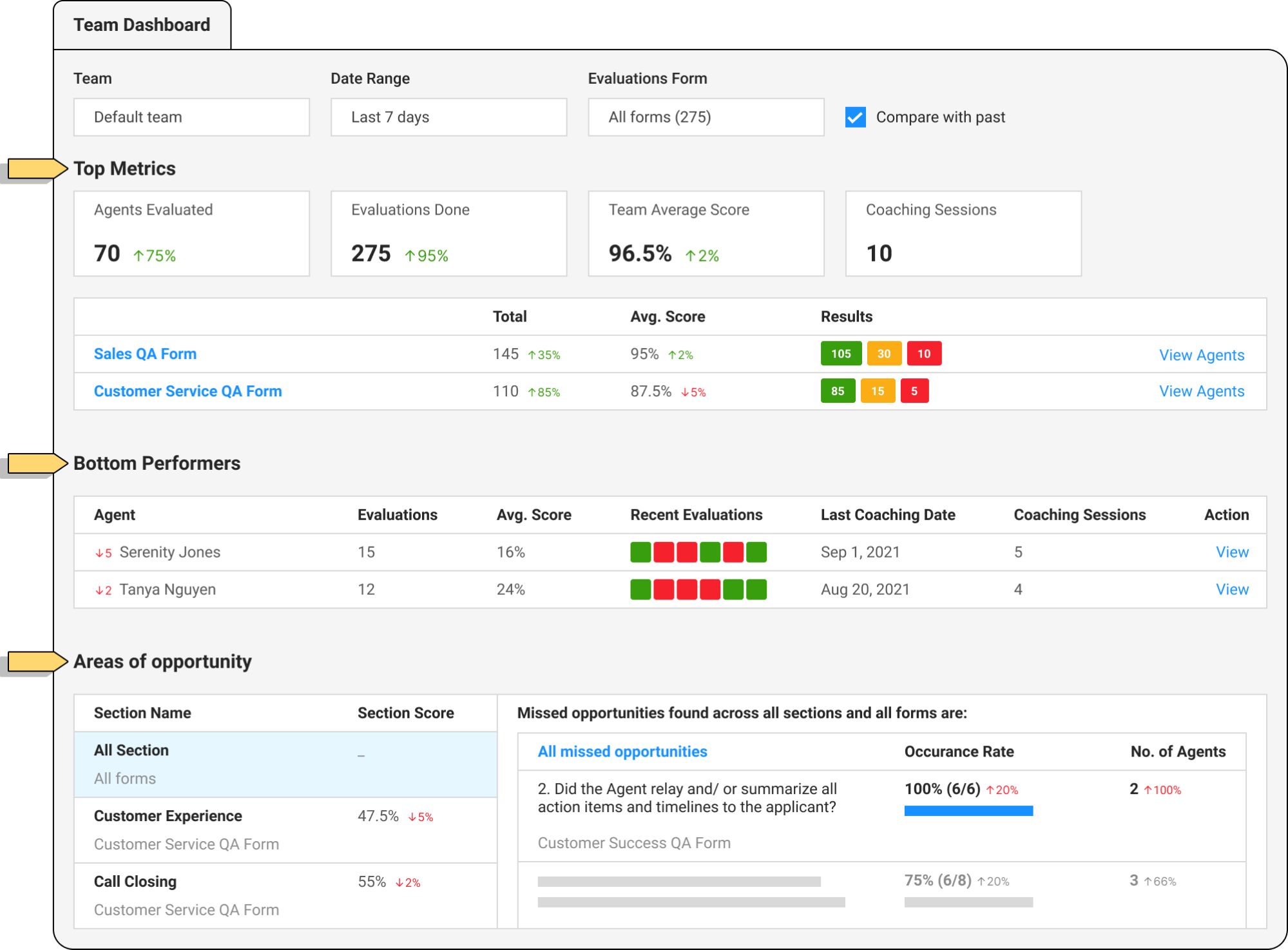
Observe.AI focuses on AI-powered quality assurance and real-time coaching for call centers. It transcribes and analyzes calls to help improve agent skills and compliance. The platform provides sentiment analysis and compliance monitoring tools. Observe.AI is designed to enhance call center performance at scale.
Key Features
- AI-Powered Quality Assurance
- Call Transcription
- Sentiment Analysis
- Agent Coaching Tools
- Compliance Monitoring
- Delivers highly accurate AI-powered quality assurance and call transcription.
- Real-time coaching features significantly improve agent communication skills.
- Compliance tools help maintain regulatory standards across calls.
- Primarily designed for large enterprises, not suitable for smaller teams.
- Pricing is high, limiting accessibility for startups or small businesses.
Pricing
- Custom pricing based on company size and needs.
How to Choose the Right AI Call Analysis Tool?
Selecting the right AI call analysis tool is essential to analyze customer interactions and improve your customer interactions and team performance. Here’s a step-by-step guide with examples to help you make the best choice, ensuring data-driven insights are prioritized.
1. Define Key Goals and Requirements
Before selecting a tool, it’s essential to determine what you want to achieve. Whether it’s improving customer satisfaction or enhancing agent performance, identifying your goals will help narrow down the options.
Example: If your goal is to reduce call handling time, look for a tool with real-time transcription and coaching features.
2. Compare Pricing and Features
Look at the features provided by each tool, including call transcription, sentiment analysis, and reporting capabilities. Also, compare pricing models to determine which one fits your budget.
Example: A startup might choose a basic plan with call recording, while a larger team needs advanced sentiment analysis and CRM integration.
3. Evaluate Data Privacy and Security
Given that call analysis involves sensitive customer data, ensure the tool follows necessary compliance standards such as GDPR or HIPAA.
Example: If you handle healthcare calls, select a platform compliant with HIPAA to protect sensitive information.
4. Focus on User-Friendliness
Choose a tool that’s easy to use and offers intuitive dashboards and reporting. A user-friendly interface will help agents and managers make the most of the tool with minimal training.
Example: A platform with a clean dashboard and minimal setup can help new agents start analyzing calls immediately.
5. Test Reporting Features
Make sure the tool provides detailed, customizable reports. This will allow you to track performance metrics and make data-driven decisions.
Example: Managers can track call sentiment trends weekly to identify training needs and improve service quality.
How AI Analyzes Phone Calls?
AI to analyze phone calls uses advanced technologies to transform raw voice data into meaningful insights. These tools automatically transcribe conversations and extract key information. They help businesses understand customer needs and improve agent interactions.
1. Importance of Natural Language Processing (NLP) and Automatic Speech Recognition (ASR)
Automatic Speech Recognition (ASR) converts spoken language into text with high accuracy. It captures every word in real-time, enabling detailed analysis. Natural Language Processing (NLP) then interprets the text by understanding context, intent, and sentiment. Together, ASR and NLP allow AI to analyse calls beyond words, identifying emotions and key topics naturally. Advances in speech recognition in AI have made this process more intuitive, enabling businesses to gain richer insights from every customer interaction.
- Ensure high audio quality: Clear, noise-free recordings are critical for AI accuracy. Invest in good microphones and quiet environments for calls.
2. Real-time Analysis and Conversation Analytics
Real-time analysis enables instant feedback during live calls. AI identifies issues, keywords, and sentiment as the conversation happens. This allows supervisors to coach agents proactively and improve customer satisfaction. Conversation analytics summarize call trends, providing deep insights for continuous improvement and strategy refinement.
Key Benefits of AI Call Analysis
AI call analysis offers multiple benefits that transform how businesses manage customer interactions. It automates call monitoring and delivers precise insights that improve decision-making. Below are some of the key advantages of adopting AI-powered call analysis.
1. Enhanced Accuracy in Transcription
One major benefit of AI call analysis is highly accurate transcription. Automatic Speech Recognition (ASR) converts speech to text with minimal errors. This accuracy ensures that no critical detail is missed during call reviews. Clear transcriptions make it easier to analyze and act on conversations, leading to detailed insights.
2. Time-Saving Automation
AI automates repetitive tasks like call logging and scoring. This saves valuable time for agents and managers alike. Instead of manual reviews, AI to analyse phone calls and handle data extraction instantly. With AI automation streamlining these processes, teams can focus more on improving customer relationships and less on administrative work.
3. In-Depth Insights into Customer Behavior
AI call analysis uncovers patterns in customer sentiment and behavior. It identifies frequently discussed topics, pain points, and buying signals. These insights help businesses tailor their approach to meet consumer preferences and customer needs better. A deeper understanding leads to more effective marketing and sales strategies.
4. Improved Customer Experience
With real-time feedback and sentiment detection, AI enhances customer interactions. Agents receive coaching based on call analytics, resulting in higher-quality conversations. This leads to faster issue resolution and more satisfied customers. Ultimately, AI helps build stronger, lasting relationships that can drive revenue growth.
5. Scalability of Call Monitoring
AI-powered tools scale effortlessly as call volumes grow. Businesses can monitor thousands of calls without increasing resources. This scalability ensures consistent quality and insight across all customer interactions. AI call analysis supports business growth without compromising efficiency.
Essential Features of AI Call Analysis Tools
AI call analysis tools offer a range of features that help businesses monitor and improve their customer interactions. These essential features, including keyword spotting, provide actionable insights by analyzing conversations deeply. Below are the key features you should look for.
1. Sentiment Analysis
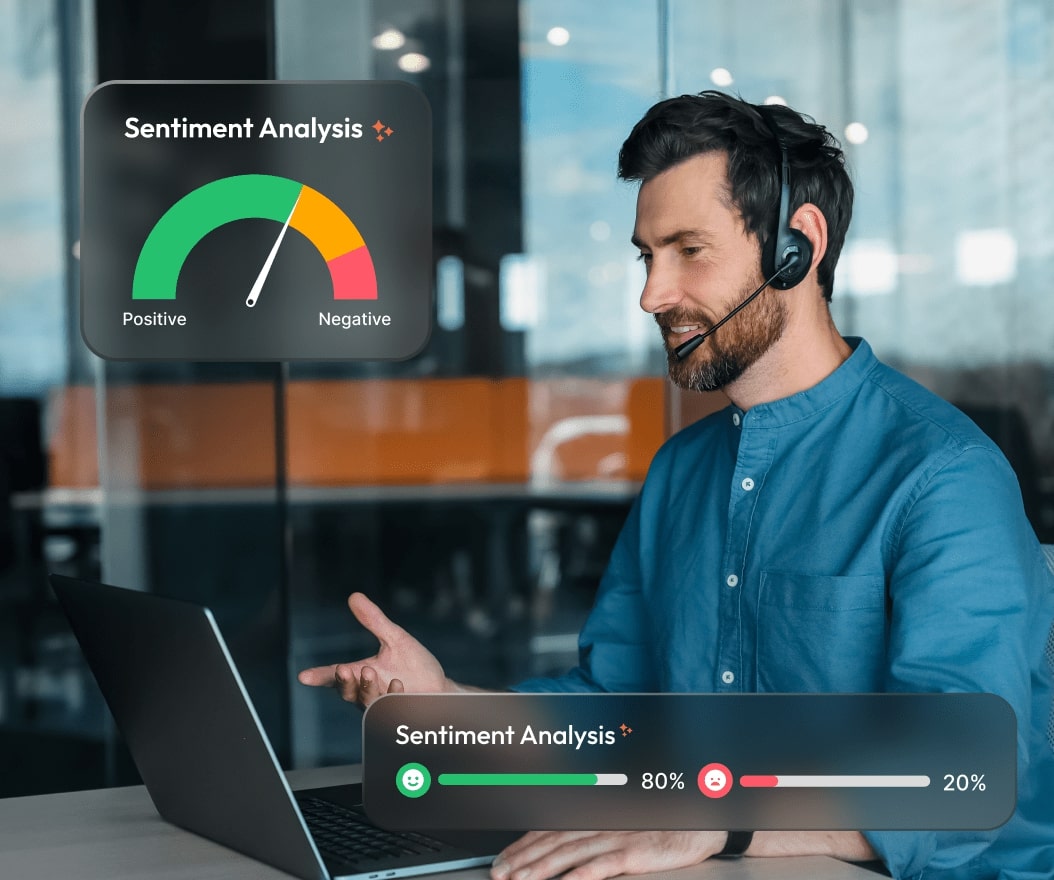
Sentiment analysis detects emotions in customer and agent voices during calls. It helps identify satisfaction, frustration, or urgency in real-time. This insight enables businesses to respond proactively and tailor their approach. Sentiment tracking improves customer experience and agent effectiveness.
- Sentiment analysis can detect frustration or satisfaction even if customers never say “I’m unhappy” or “I’m happy.”
- CallHippo AI Copilot supports multiple languages and accents, helping global teams analyze calls accurately.
- AI call analysis can proactively detect compliance risks, like missing disclosures or regulatory phrases, reducing legal exposure.
2. Call Scoring
Call scoring evaluates the quality of each conversation based on predefined criteria. AI assigns scores by analyzing tone, compliance, and call structure. This helps managers identify top performers and areas needing improvement. Call scoring streamlines quality assurance without manual intervention.
3. Real-Time Analytics
Real-time analytics provide instant insights while calls are ongoing or immediately afterward. Supervisors can monitor live conversations to offer coaching or support. Immediate data helps resolve issues faster and boosts customer satisfaction. This feature is critical for high-volume call centers.
4. Keyword and Phrase Tracking
AI tools track specific keywords and phrases to uncover trends and important topics. This helps businesses understand customer needs and common pain points. Keyword tracking also aids in compliance monitoring and detecting sales opportunities. It ensures relevant data is captured from every call.
5. Integration with CRM
Seamless integration with Customer Relationship Management (CRM) systems centralizes call data. AI to analyze phone calls syncs raw data insights directly with customer profiles. This unifies communication history, helping sales and support teams make informed decisions while also implementing necessary security measures. CRM integration enhances workflow efficiency and data accuracy.
Beyond Transcripts: How AI Transforms Call Analysis
AI to analyse calls offers more than transcription, it understands conversations deeply. This helps businesses leverage conversation intelligence tools to gain better insights and improve customer interactions. For those exploring AI for small business, this feature of call analysis offers a advantage in delivering personalized, data-driven experiences. Here’s how AI enhances call analysis.
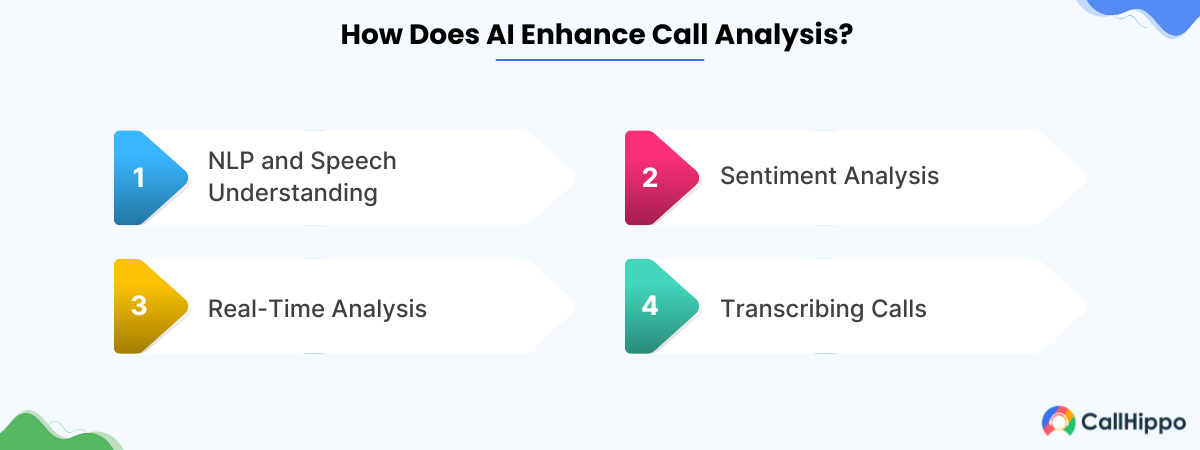
1. NLP and Speech Understanding
Natural Language Processing (NLP) allows AI to interpret words and their meaning accurately. It handles different accents, slang, and complex sentences well. This helps identify customer intent and the context of conversations precisely.
2. Sentiment Analysis
Sentiment analysis detects emotions like happiness, frustration, or anger in real-time. It helps businesses understand how customers feel during calls. This insight enables better agent coaching and improves customer satisfaction.
- Sentiment analysis integrated into call centers increases upsell and cross-sell conversion rates by 12-15% by recognizing buying signals in customer conversations.
3. Real-Time Analysis
Real-time analysis provides instant feedback while calls are happening. Supervisors can intervene or coach agents immediately if needed. This speeds up issue resolution and enhances call quality.
4. Transcribing Calls
AI converts spoken words into highly accurate text transcripts. It supports multiple languages and captures every detail clearly. These transcriptions make reviewing and analyzing calls efficient and reliable.
The Smart Metrics That Matter: What AI Call Analysis Tracks
AI call analysis helps businesses measure performance and improve both customer interactions and team efficiency. Here are the key metrics every business should monitor:
1. Conversion Rates
Conversion rate tracks how many calls result in actions like purchases or signups. AI identifies successful call patterns that lead to these outcomes. This helps refine scripts and boost overall results.
2. Talk-to-Listen Ratio

This metric shows how much agents talk versus how much they listen. A balanced ratio often leads to better customer engagement. AI flags imbalances for better agent training.
3. Customer Sentiment
AI tools detect emotional tones during conversations. Sentiment is tagged as positive, negative, or neutral in real time. These insights reveal how customers feel during calls.
4. Agent Performance
AI call analysis evaluates tone, responsiveness, and resolution quality. It highlights areas of strength and improvement. Managers use this to provide coaching and track progress.
Getting It Right: Best Practices for Smarter AI Call Analysis
To get the most value from your AI call analysis setup, it’s important to follow a strategic approach. These best practices will help you implement the tool effectively and inform strategic decisions for long-term success.
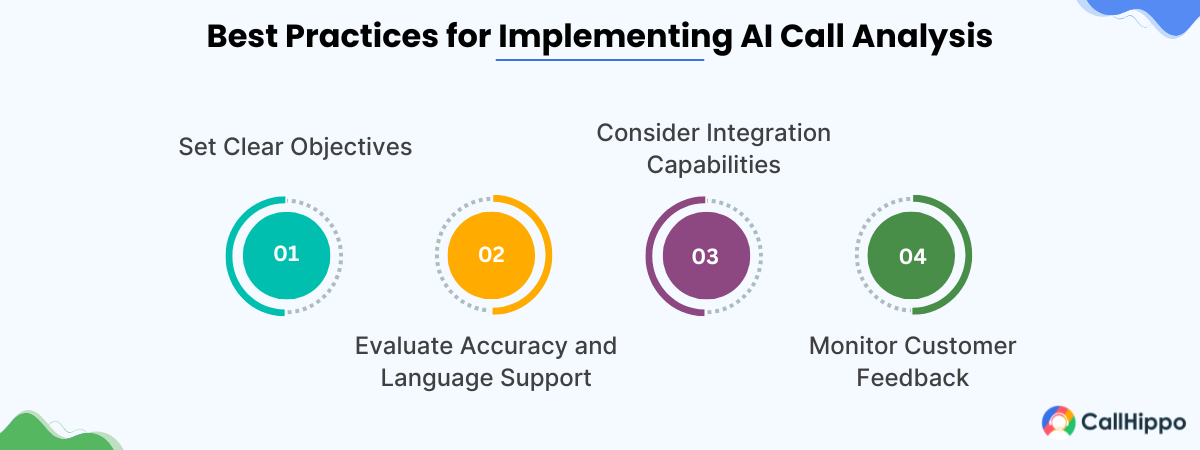
1. Set Clear Objectives
Before you deploy any tool, define your main goals clearly. Are you using AI to analyze calls to boost sales, improve support, or train agents? Having clear objectives helps you choose the right features and measure success accurately. It also ensures your team stays aligned on the tool’s purpose. Without clarity, even the best AI call analysis efforts can fall short.
2. Evaluate Accuracy and Language Support
Not all AI tools are equally accurate when transcribing calls. Choose one that supports your business’s languages, accents, and terminology. Test a few real call recordings to verify transcription quality. AI, when analyzing phone calls, must reflect real-world speech for reliable insights. Inaccurate transcriptions can lead to flawed analysis and missed opportunities.
3. Consider Integration Capabilities
Your AI call analysis platform should integrate smoothly with CRMs, helpdesk systems, and other tools. This makes it easier to sync call data with customer profiles and track outcomes. Without integration, you’ll end up switching between platforms and losing efficiency. AI tools that connect well with existing workflows improve productivity. Check for pre-built integrations or open APIs before choosing.
4. Monitor Customer Feedback
Track how AI call analysis affects the customer experience over time. Use surveys, NPS scores, or post-call analysis to gather real opinions. Customer input helps refine how AI analyzes phone calls and supports agents. This feedback loop ensures your AI system stays aligned with customer expectations. Don’t rely on metrics alone—listen to what customers are actually saying.
Common Challenges in AI Call Analysis
AI call analysis is powerful, but it comes with a few challenges businesses should be aware of. Here are the most common ones:
1. Data Overload
AI tools generate a vast amount of data from every call. Without proper filtering, teams can feel overwhelmed and miss key insights. Focus on high-impact metrics that align with your business goals.
2. Privacy Compliance
AI, when analyzing phone calls, often handles sensitive customer data. Businesses must comply with data laws like GDPR or HIPAA. Non-compliance can lead to serious legal and trust issues.
3. Integration Issues
Some AI platforms don’t integrate easily with CRMs or support systems. Poor integration creates silos and slows down workflows. Choose tools with reliable APIs and native app support.
4. Quality Audio Dependence
AI accuracy depends heavily on clear and high-quality audio. Background noise or poor call quality can distort results. Always ensure calls are recorded in a controlled environment.
5. Bias in Sentiment Analysis
AI may misinterpret tone, emotion, or cultural language patterns. This can lead to incorrect sentiment scoring and flawed conclusions. Regular human reviews help detect and correct these biases.
The Future of AI Call Analysis in Customer Support
AI call analysis is quickly moving from a support tool to a strategic advantage. As customer expectations rise, businesses will rely on AI to deliver faster, more personalized, and proactive service. We’ll see advancements like emotion-aware response systems, multilingual sentiment detection, and deeper behavioral analytics.
The global call center AI market is projected to grow from $2.65 billion in 2024 to $3.27 billion in 2025, reflecting a robust 23.4% year-over-year growth. By 2025 and beyond, AI voice analytics will play a critical role in shaping customer service strategies. It will help companies coach agents in real time, unify insights across channels, and automate quality assurance. AI call analysis is set to redefine how businesses connect with customers.
Conclusion
AI call analysis helps businesses improve conversations, enhance agent performance, and deliver better customer experiences. It turns every call into actionable insights through real-time feedback and accurate transcriptions.
By reducing manual effort and uncovering sentiment, it empowers teams to make smarter decisions faster. With tools like CallHippo, companies can scale communication, improve sales performance, and stay ahead in a competitive landscape.

Subscribe to our newsletter & never miss our latest news and promotions.
